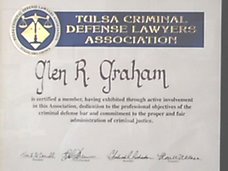What is the correct answer on the matter?
Is a fine for misd. poss. marij. authorized on not?
The easy answer is to call it a court fund assessment which is authorized instead of a fine.
Some lawyers in counties like Oklahoma County, Payne County, and Garfield County, have told me that in their court's the Judge does not imposes a "fine" on a misdemeanor possession of marijuana case but instead imposes court fund assessment and victime crime fund assessments.
The below unpublished OCCA case says no fines authorized for misdemeanor possession of marijuana and reversed the fine ordered. What is the current status of the law in the matter? Statute amended or people interpreting the statute different from this opinion?
Ronald Roger Phipps v. State of Oklahoma, Unpublished, OCCA, No. F-2000-796, (June 20, 2001).
http://www.state.ok.us/~oids/coca/PhippsRR.pdf
Vacated a $1000 dollar fine for possession of marijuana misdemeanor on the grounds that 63 O.S. Sec. 2-402 (B) (2), does not authorize a fine. Held that 21 O.S. Sec. 64 (A) generally cannot replace, or be combined with, specific punishment provisions in other titles of the Oklahoma Statutes. See 21 O.S. Sec. 11 (A); and Gaines v. State, 1977 OK CR 2459, 568 P.2d 1290 (error to combine fine provisions of the Controlled Substances Act with incarceration range in 21 O.S. Sec. 51); Brown v. State, 1976 OK CR 48, 546 P.2d 1023 (catch-all punishment provision in Title 47 controlled over catch-all provision in title 21).
The "catch-all" punishment provision (jail and fine) found in 63 O.S. Sec. 2-411 is inapplicable, as it only applies when an offense in the Uniform Controlled Substances Act provides for no punishment whatsoever. The provision here designates a specific punishment; it simply does not include a fine. The Court cannot ignore the plain meaning of a statute, or add language that is clearly not intended to be there. Arnold v. State, 48 Ok.Cr. 452, 132 P. 1123 (1913), overruled on other grounds, Lenzy v. State, 1993 OK CR 53, 864 P.2d 847.
Does anyone know the correct answer to this question [above] about whether "fines" are "authorized" pursuant to statute in a misdemeanor possession of marijuana case ---- or should it be called a "court fund assessment" instead of a fine?
Lastly, would the counties that have levied possibly "illegal" fines on misdemeanor possession of marijuana cases be required to refund the monies to the defendant's upon proper application?
Is this a possible class action law suit where a smart lawyer could make some money and get some great publicity and free advertising if successful or even if not successful???
Furthermore, if the municipalities cannot impose greater penalties that the state courts, would municipalities be required to issue refunds for fines imposed on misdemeanor possession of marijuana cases if the state statute is held or interpreted as not authorizing fines for that offense???
What about all of the lawyers who incorrectly along with Judges and prosecutors, told their clients the incorrect penalty ranges, would that provide the possibility of withdrawing the plea or setting aside the conviction and therefore make all the felony 2nd offense possession of marijuana cases possible reductions to misdemeanors?
There is a general statute for fines when not addressed in the statute concerning the crimes. But, as pointed out in the above case there is a title 63 --- general statute also, so the general statute arguably would not apply to a drug offense under title 63 since there is a more specific general statute under title 63 for title 63 offenses.
The general statute for title 21 is:
http://www.oscn.net/applications/oscn/DeliverDocument.asp?CiteID=68982
However, see:
http://tinyurl.com/2ht99c
Re: Mitchell v. State case cited below see the below link:
http://www.oscn.net/applications/oscn/deliverdocument.asp?citeid=6530
Mitchell v. State, 1987 OK CR 13, 733 P.2d 412, on rehearing held stuck the fine. (For the rehearing portion of the case see the bottom of the case in the above link)
On rehearing:
¶2 In the petition, petitioner asserts that her sentence should be modified since [733 P.2d 416] 21 O.S. 1981 § 51 [21-51] does not provide for a fine. See Gaines v. State, 568 P.2d 1290 (Okl.Cr. 1977). We agree with this contention, and find that the judgment and sentence should be modified to a term of twenty (20) years imprisonment. As modified, the judgment and sentence is affirmed.
--------------------------------------------------------------------------
Gaines v. State, 1977 OK CR 259, 568 P.2d 1290, held in striking the fine in a possession of cds case:
¶16 This instruction apparently combines the imprisonment which may be assessed under the second and subsequent offenses statute, 21 O.S. 1971 § 51 [21-51], with the fine which may be imposed under the Uniform Controlled Dangerous Substances Act, 63 O.S.Supp. 1975 § 2-401 [63-2-401]. Punishment may not be assessed by combining statutes, but must fall within the limitations of one statute only.
¶17 This Court held in Hayes v. State, Okl.Cr., 550 P.2d 1344 (1976), that when the predicate felony is one not covered under the Uniform Controlled Substances Act, punishment is to be enhanced pursuant to the provisions of the general habitual felon statute, 21 O.S. 1971 § 51 [21-51]. The fine assessed in this case does not fall within the statutory limits of Section 51, which provides for punishment by imprisonment in the penitentiary for a term not less than ten (10) years. For the above reasons judgment and sentence must be modified to a term of fifty (50) years' imprisonment
Unpublished case says fines not authorized on misdemeanor possession of marijuana cases
Subscribe to:
Post Comments (Atom)






No comments:
Post a Comment